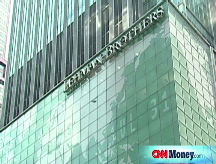Should Bank of America save Lehman?
With reports suggesting that Bank of America may take over the embattled investment bank, Wall Street debates if a purchase is worth the risk.

 |
| Bank of America CEO Ken Lewis has won praise for successful purchases of Fleet and MBNA. But would a takeover of Lehman so soon after buying Countrywide be too risky? |
NEW YORK (CNNMoney.com) -- Bank of America has apparently emerged as the likely "white knight" bidder for Lehman Brothers.
But since the nation's largest retail bank earlier this year already made the bold move to buy Countrywide, is adding another battered financial institution a good idea?
Wall Street appears to be guardedly optimistic about the possibility of a BofA/Lehman deal.
Shares of BofA (BAC, Fortune 500) were flat in early trading Friday even though Lehman's (LEH, Fortune 500) stock tumbled another 11% and several other financials fell as well.
"Somebody is going to make a lot of money in the next five years picking up the pieces on these troubled entities and Bank of America could be one of those companies," said Jim Denney, principal of Mohawk Asset Management, an investment firm which owns a small stake in Bank of America.
Denney said he's concerned about the added risk that BofA would take on by purchasing Lehman.
But he also pointed out that BofA CEO Ken Lewis has a history of making acquisitions that were initially met with skepticism but turned out to be great deals, most notably the purchases of FleetBoston and credit card giant MBNA.
Another fund manager that owns BofA shares said that he trusts Lewis to not make a deal that would hurt the company's future profits and shareholders.
"Lewis has been a smart business person and savvy buyer. We are willing to defer to his expertise," said David Katz, manager of the Matrix Advisors Value fund. "Lehman is a powerful and valuable business franchise. If they think they can do a deal prudently, they quite possibly could be getting a good business at a fire sale price."
In addition, it's beginning to look as if BofA wouldn't be shouldering all the risk involved with Lehman. The Financial Times reported Friday that private-equity firm JC Flowers and the Chinese sovereign wealth fund China Investment Co. may team up with BofA on a joint bid for Lehman. That may be reassuring BofA investors.
Still, another fund manager who dumped his stake in BofA earlier this year even conceded that a Lehman deal could be a smart one for BofA.
John Snyder, manager of the John Hancock Sovereign Investors fund, who said he sold his stake because he was concerned about the lack of earnings visibility and increased risk associated with the Countrywide deal, said a move for Lehman could be savvy as long as Lewis doesn't overpay.
"Lehman is a good franchise and there is probably some value left. I think it all depends on what they pay for it," he said.
Along those lines, analysts from fixed income research firm CreditSights, in a report Friday morning, wrote that even if BofA were to pay a 50% premium to Lehman's $4.22 closing price from Thursday, a merger could wind up adding about 9% to BofA's earnings.
The CreditSights analysts estimated that BofA would probably need to set aside between $6 billion and $8 billion to cover the costs for additional capital requirements to support Lehman's decimated mortgage portfolio and to unwind some of Lehman's trading positions.
And Richard Bove, an analyst with Ladenburg Thalmann, wrote in a report Friday that a purchase of Lehman would immediately make BofA a powerhouse in fixed-income trading and a top-ranked equity underwriter and investment bank.
"This deal would be a major plus if the bank wins it," he wrote.
Of course, the risks are enormous. Lehman's exposure to commercial real estate could be a major headache for BofA.
In addition, published reports have suggested that the Federal Reserve may not be willing to guarantee loan losses in a Lehman deal as it did with JPMorgan Chase's (JPM, Fortune 500) "takeunder" of Bear Stearns. So that could also make a purchase more perilous.
Denney warns that BofA, or any other firm for that matter, will not be able to fix Lehman overnight. And if the problems in housing and the credit crunch last significantly longer, a purchase of Lehman ultimately could be looked back upon as a colossal mistake.
"Nobody's going to look like a hero in six months by buying Lehman. You have to look three to five years out. This could be a grand slam home run or big time whiff," he said. ![]()



